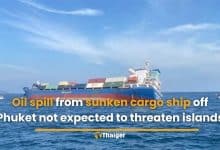RTN mobilised to deal with oil leak off Gulf of Thailand

Thailand today mobilised the Royal Thai Navy (RTN) to aid in the rescue of an oil storage vessel and contain damage to the environment. The vessel suffered damage during routine maintenance in the Gulf of Thailand earlier this week.
According to government spokesman Anucha Burapachaisri, the RTN will focus on assisting the crew in plugging a leak that resulted in seawater seeping into the hull of the ship. The RTN’s efforts will also aim to prevent any potential oil spillage as the crude carrier is carrying 400,000 barrels of crude oil.
The incident occurred on Tuesday when a machine exploded during a maintenance check, causing seawater to enter the FSO Bechamas 2 vessel, Bangkok Post reported. Tragically, one crew member lost his life in the explosion. However, the remaining 28 crew members are safe, and the ship is reported to be in stable condition.
Currently stationed at a location approximately 207 kilometres from the Sattahip naval base in eastern Chon Buri province, the RTN will also assist in the recovery of the deceased crew member’s body. Furthermore, the navy has developed contingency plans to deal with the possibility of an oil spillage. As of now, there have been no reports of any crude oil leakage.
Over the past few years, Thailand has experienced several incidents of oil spills that have had a significant impact on the environment and local communities.
In 2013, an oil spill occurred in the Gulf of Thailand, affecting popular tourist destinations such as Koh Samet. The spill, which was reportedly caused by a leak in a pipeline operated by PTT Global Chemical Plc, resulted in the closure of beaches and caused extensive damage to marine life and coral reefs.
In 2019, a crude oil pipeline owned by PTT Global Chemical Plc in the eastern province of Rayong ruptured, leading to another oil spill. The incident caused the closure of a nearby beach and sparked concerns about the impact of the spill on the local fishing industry.
In addition to these incidents, there have been reports of smaller-scale oil spills in various parts of Thailand in recent years. These incidents have highlighted the need for better regulations and measures to prevent and mitigate the impact of oil spills.
The Thai government has taken steps to address these concerns, including the development of stricter regulations for the transportation and storage of hazardous materials. However, the recent incident is a setback in the ongoing challenges of preventing and responding to oil spills.
Latest Thailand News
Follow The Thaiger on Google News:


























